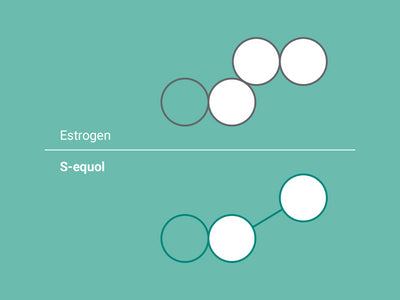
Menopause Today: Navigating This New Journey in the Midst of Social Distancing
LeeCole Legette, PhD
EQUELLE’s Principal Nutrition Scientist weighs in on managing menopause as we face today’s new normal in the midst of social distancing.
March is Women’s History month and earlier this month we celebrated International Women’s Day. Globally, women are connected through shared phases of life. This month, and particularly within the past few weeks, there is no one singular event linking humanity than the COVID-19 pandemic. During this unprecedent time in history, women are continuing to navigate and enter menopause which brings its own unique changes. By trying new mindful and calming practices to ease menopausal symptoms, one can be equipped for her new normal in the midst of today’s everchanging landscape.
As one enters menopause, the journey is unique but there are some common issues that many women face along the way. At the start, women enter into perimenopause and experience various symptoms including irregular periods, hot flashes and night sweats, and sleep disturbances as her body reacts to hormonal fluctuations. As she progresses through menopause into post menopause, her symptoms might change following her final menstruation and could include mood swings, weight gain, and forgetfulness. These issues are complex and coupled with other lifestyle changes, can be challenging. Below are some suggestions to help you adjust and optimize your health in a dynamic environment.
Be Comfortable in Your Space
As we are in encouraged to stay in our homes and practice social distancing, let’s use this time to reflect and adjust our space to meet our needs. This may be a great occasion to reorganize the closet and select soft and relaxing clothing to ease hot flashes and night sweats. You can also redecorate and create a special atmosphere to support rest and relaxation helping alleviate any sleep and mood issues. The U.S. Office of Women’s Health recommends incorporating good sleep habits to help support health during menopause such as adopting consistent times for sleep and having a dedicated space for rest only.1 This is especially important now as our spaces are serving dual purposes of both home and work areas. Consider dedicating your bedroom as a technology free zone as bright lights of devices can interrupt sleep.
Chart Your Own Wellness Routine
Daily exercise and good nutrition are integral to health, particularly during menopause. As recent events change our normal routines, we may need to adjust and modify our activities. Certain exercises such as yoga and stretching have been shown to help ease hot flashes.1,2 There are a variety of online yoga classes to explore and try to see which one suits you best. Physical activity is also important in managing weight, particularly during menopause.1 When you are in need of fresh air and a calming moment, take a brief solo walk or hike around your neighborhood. You may also consider shaking your stress away with an impromptu dance party at home. In addition to movement, it is recommended that you take care of your body by providing it with healthy foods for fuel. Some foods may impact different menopausal symptoms. For instance, spicy foods and caffeine can serve as triggers for hot flashes.1 Other foods can help provide key nutrients and benefit overall wellness. Foods rich in calcium such as yogurt and milk can help support bone health which is a key concern for postmenopausal women.3 Be purposeful in meal-planning to maximize benefits of a well-balanced diet. Learn more: Superfoods to Soothe Your Menopause Transition.
Seek Out Wise Counsel
Menopause is a universal stage in a women’s life. Learning and discussing our experiences as a collective can be insightful. There are online resources and groups available to gain tips and advice on thriving during menopause such as The Pausitivity Movement. Seek out advice from friends and family on their menopause experience. Make regular efforts to connect, ask for help, and provide updates via Google Hangouts, one-on-one video chats, and/or Zoom conference calls.
Take a Moment to Breathe and Focus
Menopause can be an anxious time for some with new body changes and symptoms occurring including mood irritability as well as physical discomfort due to hot flashes and night sweats. Other stressful changes can compound these frustrations and may exacerbate mood issues that occur with menopause. The US Centers for Disease Control (CDC) recommends several techniques to cope with stress enabling you to support yourself, your family and friends, and your community. The CDC encourages people to be intentional about their mental health including taking deep breaths and making time to unwind.4 Check out different meditation apps such as Insight Timer and Headspace that can help guide you through renewing meditation routines. It is also advised to maintain connection with others. You can schedule online game sessions, mail letters and notes, as well as call and reconnect with old friends.
As you learn to master your menopausal journey, it’s important to keep in mind one central guiding principle – your wellness impacts not only you but everyone around you so devote time to determining the right health practice that meets your evolving needs.
References
- US Office of Women’s Health. “Menopause – Symptoms & Relief” 2018. Accessed on March 23, 2020. < https://www.womenshealth.gov/menopause/menopause-symptoms-and-relief#13>
- Innes, KE et al. Mind-body Therapies for Menopausal Symptoms: A Systematic Review.Maturitas. 2010; 66(2): 135-149.
- National Institutes of Aging. “What is Menopause?” 2017. Accessed on March 23, 2020. <https://www.nia.nih.gov/health/what-menopause>
- US Centers for Disease Control. “Coronavirus Disease 2019 (COVID-19) – How to Prepare: Manage Anxiety and Stress.” 2020. Accessed on March 23, 2020. < https://www.cdc.gov/coronavirus/2019-ncov/prepare/managing-stress-anxiety.html>


